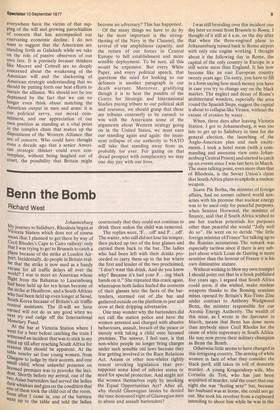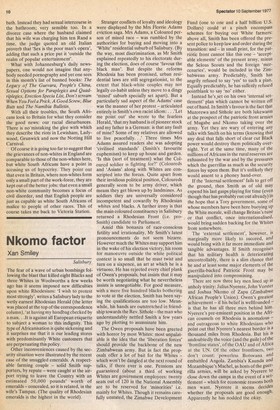Berm the Bomb
Richard West
Johannesburg My journey to Salisbury, Rhodesia began at Victoria Station which does not of course mean that I planned to get there by way of Cecil Rhodes's Cape to Cairo railway: only that I was trying to get to Brussels to catch a Plane because of the strike at London Airport. Incidentally, do people in Britain realise that the strike is now used as a handy excuse for all traffic delays all over the World? I was to meet an American whose flight from the Bahamas to Luxembourg had been held up for ten hours because of the strike at Heathrow, and a South African Who had been held up even longer at Seoul, South Korea because of Britain's air traffic control assistants. The ill-will we have earned will not do us any good when we next try and cadge off the International Monetary Fund. At the bar at Victoria Station where I we. nt for a beer before catching the train I witnessed an incident that was to stick in my Mind up till after reaching South Africa for reasons that should be apparent. At the table nearby at four young women, from Glasgow to judge by their accents, and one small child, whose unlawful presence on licensed premises was to provoke the incident. Shortly before my arrival, one of the two Asian bartenders had served the ladies their whiskies and gins on the condition that c,nne of them took the child out of the room. anon after I came in, one of the barmen Went up to the table and told the ladies courteously that they could not continue to drink there unless the child was removed.
The replies were, 'F. . .off and P. . .off . The waiter, who still did not lose his temper, then picked up two of the four glasses and carried them back to the bar. The ladies who had been left with their drinks proceeded to carry them up to the bar where the first and louder of the two proclaimed, "I don't want this drink. And do you know why? Because it's had your F. . .ing black hands on it." She repeated this crack again, whereupon both ladies hurled the contents of their glasses into the faces of the bartenders, stormed out of .the bar and gathered outside on the platform to jeer and crow at their dripping adversaries.
One may wonder why the bartenders did not call the station police and have the women arrested and charged with abusive behaviours, assault, breach of the peace or merely with taking a child onto licensed premises. The answer, I feel sure, is that non-white people no longer bring charges under such sensible old laws because they fear getting involved in the Race Relations Act. Asians or other non-whites rightly resent invoking legislation that presupposes some kind of inferior status or need for special protection. And might not the women themselves reply by invoking the Equal Opportunities Act? After all, why should Glaswegian lassies be denied the time-honoured right of Glaswegian men to abuse and assault bartenders? I was still brooding over this incident one day later en route from Brussels to Rome. I thought of it still at 4 a.m. on the day after that when the three-engined plane to Johannesburg turned back to Rome airport with only one engine working. I thought about it the following day in Rome, the capital of the only country in Europe in a still worse mess than England. It has now become like an east European country twenty years ago. On entry, you have to fill in a form saying how much money you have in case you try to change any on the black market. The neglect and decay of Rome's architectural wonders, especially the area round the Spanish Steps, suggest the capital is about to collapse like Venice, without the excuse of erosion by water.
When, three days after leaving Victoria Station, I got to Johannesburg, it was too late to get up to Salisbury in time for the general election, the launching of the Anglo-American plan and such excitements. I took a hotel room (with a commanding and awesome view onto Johannesburg Central Prison) and started to catch up on events since I was last here in March. The main talking point, even more than that of Rhodesia, is the Soviet Union's claim that South Africa plans to explode a nuclear weapon.
Suave Pik Botha, the minister of foreign affairs, had no sooner calmed world anxieties with his promise that nuclear energy was to be used only for peaceful purposes, when Senator Harwood, the minister of finance, said that if South Africa wished to use her nuclear potentials for purposes other than peaceful she would -Jolly well do so". He went on to deride "the little foreign minister of France"for talking up to the Russian accusations The remark was especially tactless since if there is any subject about which Louis de Guiring is more sensitive than the honour of France it is his own diminutive stature.
Without wishing to blow my own trumpet I should point out that in a book published five years ago, I argued that South Africa could soon, if she wished, make nuclear weapons thanks to the Rossing uranium mines opened by Britain's Rio-Tinto Zinc under contract to Anthony Wedgwood Benn, the minister responsible for our Atomic Energy Authority. The wealth of this mine, as I wrote in the Spectator in March, means that Benn has done more than anybody since Cecil Rhodes for the cause of white supremacy in South Africa. He may now prove their military champion as Benn the Bomb.
Otherwise little seems to have changed in this intriguing country. The arming of white women in face of what they consider the black peril, still takes its toll of domestic murder. A young Krugersdorp wife, Mrs Cornelia du Toit, who has just been acquitted of murder, told the court that one night she was "feeling sexy" but, because her husband was at home, she could not go out. She took his revolver from a cupboard intending to shoot him while he was in the bath. Instead they had sexual intercourse in the bathroom; very sensible too. In a divorce case where the husband claimed that his wife was charging him ten Rand a time, the judge quoted an old Italian proverb that 'Sex is the poor man's opera', adding that such a price put it 'outside the realm of popular entertainment'.
What with Johannesburg's daily newspapers, one would not imagine that anybody needed pornography and yet one sees in this month's list of banned books: The Legacy of The Guevara, People's China, Sexual Options for Paraplegics and Quadriplegics, Erection Specia List, Don't scream When You Feel a Prick, A Good Screw, Blue Buts and The Namibia Bulletin, With all their troubles, the South Africans look to Britain for what they consider the good news: our racial disturbances. There is no 'mistaking the glee with which they describe the riots in Lewisham, Ladywood, Grunwick and now the Notting Hill Carnival.
Of course it is going too far to suggest that the grievances of non-whites in England are comparable to those of the non-whites here, but white South Africans have a point in accusing us of hypocrisy. They point out that even in Britain, where non-whites form only a small part of the work-force, they are kept out of the better jobs: that even a small non-white community becomes a focus of civil disorder, and that English people are just as capable as white South Africans of malice to people of other races. This of course takes me back to Victoria Station.































 Previous page
Previous page